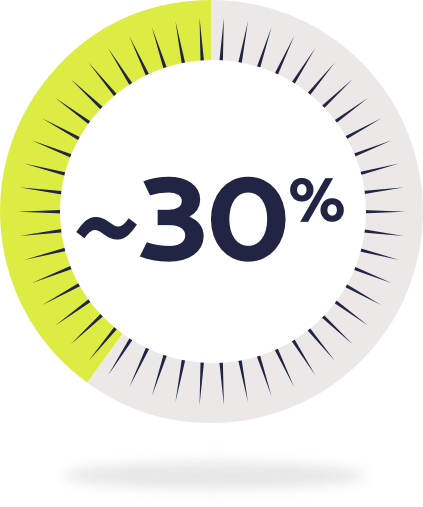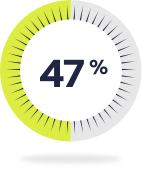COMMON COMORBIDITIES: MOOD & OTHER DISORDERS
Mood disturbances can mask a diagnosis of adult ADHD9
Although ADHD and mood disturbances are distinct, they often share overlapping clinical features, including changes in brain structure and function, neurotransmitter dysregulation, and genetic contributions.10

The prevalence rate of depression in adults with ADHD is estimated at up to ~30%11
Depression and ADHD in adults may present with similar features—maladaptive cognitions and avoidant behavior—which can make effective diagnosis and treatment difficult.11,12

Bipolar disorder has been shown to be present in up to 47% of adults with ADHD.9
- Individuals with ADHD who develop bipolar disorder may have an earlier age of onset, shorter periods of remission between bipolar episodes, and higher rates of psychiatric morbidity.13

Anxiety disorders also appear to be overrepresented in adults with ADHD, approaching a prevalence of 50% in this population.14
- Individuals with ADHD and comorbid anxiety tend to have more severe symptoms, earlier age of onset, and greater risk for substance use disorder14
Mood Disturbances and ADHD
MAJOR DEPRESSIVE DISORDER (MDD)11,12
Shared Features
- Avoidant behaviors
- Maladaptive cognition
- Low frustration tolerance
Differential Distinguishers
- ADHD: Disturbance in mood is characterized by irritability rather than sadness or loss of interest
- MDD: Poor concentration in mood disorders becomes prominent only during a depressive episode
Key Facts
- Additional symptoms distinguishing primary depression from ADHD include sleep dysfunction, anhedonia, and feelings of low self-worth
- Depression in the context of adult ADHD is often more severe and more of an impairment
BIPOLAR DISORDER (BD)12,14,15
Shared Features
- Labile mood
- Difficulty modulating emotions
- Attempting risky/dangerous feats
Differential Distinguishers
- ADHD: Individuals with adult ADHD may show emotional dysregulation, including shifting affect, mood lability, and emotional overreaction
- BIPOLAR DISORDER: Mood changes must last ≥4 days to be a clinical indicator
Key Facts
- A diagnosis of bipolar disorder is suggested by extreme mood shifts, prolonged periods of depression or euphoria, or thought disturbances
- Presence of a depressive phase, as well as an episodic course of symptoms, helps to elucidate a diagnosis of bipolar disorder
ANXIETY DISORDERS12,14
Shared Features
- Restlessness
- Difficulty focusing
Differential Distinguishers
- ADHD: Restlessness is not typically associated with worry or ruminations
- ANXIETY DISORDER: Patients may show excessive worry/panic in the face of everyday stressors and may avoid social situations or environmental stressors that trigger anxiety
Key Facts
- Anxiety disorders are typically persistent, lasting 6 months or more
- The presence of anxiety in adults may inhibit the impulsivity typical for ADHD
This table is intended as a quick reference guide only. For full diagnostic criteria, please refer to the American Psychiatric Association’s Diagnostic and Statistical Manual of Mental Disorders (DSM–5).
Common Comorbidities in Comorbid Complex ADHD: Prevalence, Age of Onset, Diagnosis, and Clinical Implications
Dr. Cutler, associate clinical professor in the Department of Psychiatry, SUNY Upstate Medical University in Syracuse, NY, discusses comorbid complex ADHD—prevalence, age of onset, diagnosis, and clinical implications.
Hello, I'm Dr. Andrew Cutler, associate clinical professor in the Department of Psychiatry, SUNY Upstate Medical University in Syracuse, New York. And I'm pleased to be discussing comorbid complex ADHD – prevalence, age of onset, diagnosis, and clinical implications.
Comorbid complex ADHD is very common — studies show that three- quarters of individuals with ADHD have at least one psychiatric condition, and 80% of those have more than one comorbidity. 1
But why do people with ADHD have comorbidities? It’s possible that one disorder is a precursor to the other (evolving over time), it could be a risk factor for developing the other, or they may have a common genetic basis. Some comorbid disorders (such as depression and anxiety) may develop due to the impact of ADHD, making it a secondary condition. 2,3
The comorbidity profile can change throughout the lifespan. In children and adolescents, studies have shown a high incidence of oppositional defiant disorder, which decreases in adulthood. However, in adults, we see problems with emotional dysregulation, stubbornness, trouble managing anger, and other negative emotions. In addition, those comorbidities that tend to be less common in childhood, such as conduct issues, anxiety, major depressive disorder, and substance use disorder, increase in incidence through adolescence, and into adulthood.
The cumulative burden of comorbid complex ADHD evolves and accumulates throughout the lifespan. For example, although oppositional defiant disorder is the most common comorbidity in children, conduct disorder and anxiety are also seen, with the impact of these, along with ADHD, resulting in low self-esteem in this age group. Moving from childhood into adolescence and adulthood, oppositional defiant disorder and conduct disorder decrease, but criminal behaviors start to show, with antisocial personality disorder becoming more common. In addition, learning delays in childhood develop into complex learning difficulties in adolescence and adulthood. With this progression, people often become demoralized and frustrated, resulting in lack of motivation and under achievement. Substance abuse comes into play as well. 2,4-8Es
The presence of comorbidities in different age groups can complicate the diagnosis of ADHD, as symptoms of these comorbidities often overlap with symptoms of ADHD. For example, ADHD symptoms of restlessness, agitation, difficulty concentrating, and decreased attention are also seen in major depressive disorder, bipolar disorder, anxiety, substance use disorder, and sleep disorders; and the ADHD symptom of impulsivity [activate slide build] is also seen in conduct disorder, bipolar disorder, and substance use disorder. 2,9
So, given the overlap of symptoms of ADHD and its comorbidities, what are the steps to ensure an accurate diagnosis? First, it's important to establish the diagnosis, by confirming that the individual meets DSM-5 criteria for ADHD. Then, you should rule out alternative explanations for the symptoms. Finally, and as we've already talked about, it's important to assess for comorbid conditions, which may affect the treatment of ADHD, as well as the diagnosis. 10
For example, to differentiate ADHD from depression, it is necessary to identify which symptoms of depression overlap with ADHD and which are distinct. Overlapping symptoms include loss of motivation, problems concentrating, and restlessness or irritability. So, if your patient has any of these symptoms, it could be ADHD, depression, or both. However, if your patient has only symptoms of depression that are distinct from ADHD, such as feelings of sadness, thoughts of suicide, or changes in eating or sleeping, it is likely depression. 2
Thank you for being part of this Team ADHD educational presentation.
REFERENCES: 1.Banaschewski T, et al. Attention- Deficit/Hyperactivity Disorder. Dtsch Arztebl Int. 2017;114(9):149-159. 2.CADDRA Canadian ADHD Practice Guidelines 2018. https://www.caddra.ca/wp-content/uploads/CADDRA-Guidelines-4th-Edition_-Feb2018.pdf 3.Pliszka SR. Comorbidity of ADHD with psychiatric disorder: an overview. J Clin Psychiatry. 1998;59:50-58. 4.Turgay A, Ansari R. Major depression with ADHD in children and adolescents. Psychiatry. 2006;3(4)20-37. 5.Goodman DW. ADHD in adults: update for clinicians on diagnosis and assessment. Primary Psychiatry. 2009;16(11):21-30. 6. Faraone SV et al. Attention- deficit/hyperactivity disorder. Nat Rev Dis Primers. 2015;1:1-23. 7.Harpin VA. The effect of ADHD on the life of an individual, their family, and community from preschool to adult life. Arch Dis Child. 2005;90(Suppl I):i2–i7. 8. Biederman J, et al. Adult outcome of ADHD: a controlled 16-year follow up study. J Clin Psychiatry. 2012;73(7):941- 950. 9.Kooij S, et al. Distinguishing comorbidity and successful management of adult ADHD. J Atten Disord. 2012;16:3S-19S. 1. 10. American Academy of Pediatrics. ADHD: Clinical Practice Guideline for the Diagnosis, Evaluation, and Treatment of Attention-Deficit/Hyperactivity Disorder in Children and Adolescents Pediatrics. 2011;128:1007–1022.
RSD, CFS, and Sleep Disorders
Impact on other psychosocial domains may also be present in adults with ADHD16-22
Adults with ADHD can experience significant issues with self-concept and motivation, as well as sleep disturbances16-22
Rejection sensitive dysphoria (RSD) is a condition unique to ADHD16
RSD is a manifestation of emotional dysregulation, which is understood to be a core symptom of adult ADHD.17,18 RSD occurs specifically in individuals with ADHD and constitutes an extreme emotional sensitivity triggered by a perception that the person has been16,17
- Rejected
- Teased
- Criticized
- A disappointment to important people in his/her life
- Falling short of his/her own standards or goals
The RSD response is often cultivated through years of accumulated social rejection associated with the lived experience of ADHD, which leaves individuals exquisitely sensitive to criticism.16
Response to perceived emotional assaults in individuals with RSD can be dramatic—manifesting along a spectrum from extreme depression to rage.16 The RSD phenomenon leads some to avoid future opportunities for fear of rejection, which may be mistaken for social phobia.16 Other individuals with RSD become “people pleasers,” with a drive for perfection and unattainable standards.16
Amotivational features and chronic fatigue
Adults with ADHD may appear to lack the motivation needed to function appropriately in academic and work situations19
Amotivational features seen in patients with ADHD include19:
- Avoiding more work than what is strictly necessary
- Avoiding very demanding projects
- Giving up when success does not seem likely
- Not being ambitious
Deficits in the dopaminergic pathway that governs reward and motivation have also been hypothesized to underlie the amotivation seen in patients with ADHD.19
It is also important to recognize the potential contribution of chronic fatigue syndrome (CFS) when assessing patients with ADHD who have amotivational features.20
Both ADHD and chronic fatigue share overlapping clinical presentations, including significant cognitive difficulties in the areas of complex attention, executive functioning, and memory.21
- Chronic stress and hyperactive behavior are also risk factors for CFS, leading to the hypothesis that ADHD may be a precursor to this disorder in adult patients20
- A study of adults with CFS (N=158) found that approximately a third also met diagnostic criteria for childhood ADHD20
- CFS patients with comorbid ADHD exhibited more severe psychiatric symptoms, including depression, anxiety, and risk for suicide20
- ADHD and CFS may share an underlying mechanism, with symptoms of both responding to pharmacotherapy with stimulant medications23
ADHD is frequently associated with disturbed sleep22,24

In clinical practice, sleep problems have been reported in up to 80% of patients with ADHD—adults who do not get enough sleep are more likely to have ADHD symptoms.22,24
Sleep issues common in adults with ADHD include:
- Insomnia (prolonged sleep onset and frequent nighttime awakening)22
- Circadian rhythm disorders24
- Restless leg syndrome24
ADHD and sleep disturbances share a common neurobiologic etiology25
Overlapping areas of the brain are implicated in both ADHD and sleep dysfunction:
- The dorsolateral, ventrolateral prefrontal and dorsal anterior cingulate cortices brain regions involved in ADHD, also regulate arousal and are sensitive to sleep deprivation25
- Delayed response to melatonin and dysfunctional thermoregulation, which cause sleep dysfunction, have been identified in patients with ADHD26
Key Takeaways
- Adults with ADHD have a significantly higher risk for SUD4
- Mood disturbances can complicate a diagnosis of ADHD11,12
- Adults with ADHD can also experience impairments in self-concept and motivation16,19-22
- ADHD is commonly associated with disturbed sleep22,24
UP NEXT:
REFERENCES
- Piñeiro-Dieguez B, Balanzá-Martínez V, García-García P, et al. Psychiatric comorbidity at the time of diagnosis in adults with ADHD. J Atten Disord. 2014;20:1066-1075.
- Wilens TE, Kaminski TA. The co-occurrence of ADHD and substances use disorders. Psychiatr Ann. 2018;48(7):328-332.
- Miranda A, Colomer C, Berenguer C, Roselló R, Roselló B. Substance use in young adults with ADHD: comorbidity and symptoms of inattention and hyperactivity/impulsivity. Int J Clin Health Psychol. 2016;16:157-165.
- Zulauf CA, Spirch SE, Safren SA, Wilens TE. The complicated relationship between attention-deficit/hyperactivity disorder and substance use disorders. Curr Psychiatry Rep. 2014;16(3):436. doi.10.1007/s11920-013-0436-6.
- Bukstein O. Substance abuse in patients with attention-deficit/hyperactivity disorder. Medscape J Med. 2008;10(1):24.
- Crunelle CL, van den Brink W, Moggi F, et al. International Consensus Statement on Screening, Diagnosis, and Treatment of Substance Use Disorder in Patients with Comorbid Attention Deficit/Hyperactivity Disorder. Eur Addict Res. 2018;24:43-51.
- Quinn PD, Chang Z, Hur K. ADHD medication and substance-related problems. Am J Psychiatry. 2017;174(9):887-885.
- Volkow ND, Swanson JM. Adult attention-deficit disorder. N Engl J Med. 2013;369(20):1935-1944.
- Clemow DB, Bushe C, Mancini M, Ossipov MH, Upadhyaya H. A review of the efficacy of atomoxetine in the treatment of attention-deficit hyperactivity disorder in children and adult patients with common comorbidities. Neuropsychiatr Dis Treat. 2017;13:357-371.
- Faraone SV, Asherson P, Banaschewski T, et al. Attention deficit/hyperactivity disorder. Nat Rev Dis Primers. 2015:1:1–23.
- Knouse LE. Depression in adults with attention-deficit hyperactivity disorder (ADHD): the mediating role of cognitive-behavioral factors. Cognit Ther Res. 2013;37(6):1220-1232.
- American Psychiatric Association. Diagnostic and Statistical Manual of Mental Disorders. 5th ed. Washington, DC: American Psychiatric Publishing; 2013.
- McIntyre RS, Kennedy SH, Soczynska JK, et al. Attention-deficit/hyperactivity disorder in adults with bipolar disorder or major depression disorder: results from the international mood disorders collaborative project. Prim Care Companion J Clin Psychiatry. 2010;12(3) CC.09m00861. doi: 10.4088/PCC.09m00861gry.
- Katzman MA, Bilkey TS, Chokka PR, Fallu A, Klassen LJ. Adult ADHD and comorbid disorders: clinical implications of a dimensional approach. BMC Psychiatry. 2017;17:302.
- Adler LA, Silverstein MJ. Emotional dysregulation in adult ADHD. Psychiatr Ann. 2018;48(7):318-322.
- Dodson W. Emotional dysregulation and rejection sensitivity. ADDitude Magazine. Published online October 9, 2016. Accessed April 18, 2021.
- Dodson W. New insights into rejection sensitive dysphoria. ADDitude Magazine. Published online March 23, 2021. Accessed May 18, 2021.
- Kooij JJS, Bijlenga D, Salerno L, et al. Updated European Consensus Statement on diagnosis and treatment of adult ADHD. Eur Psychiatry. 2019;56:14-34.
- Volkow ND, Wang G-J, Swanson JM et al. Motivation deficit in ADHD is associated with dysfunction of the dopamine reward pathway. Mol Psychiatry. 2011;16(11):1147-1154.
- Sáez-Francàs N, Alegre J, Calvo N, et al. Attention-deficit hyperactivity disorder in chronic fatigue syndrome patients. Psychiatry Res. 2012;200:748-753.
- Rogers DC, Dittner AJ, Rimes KA, Chlader T. Fatigue in an adult attention deficit disorder hyperactivity population: a trans-diagnostic approach. Br J Clin Psychol. 2017;56:33-52.
- Wajszilber D, Santiseban JA, Gruber R. Sleep disorders in patients with ADHD: impact and management changes. Nat Sci Sleep. 2018;10:453-480.
- Young JL. Chronic fatigue syndrome: 3 cases and a discussion of the natural history of attention-deficit/hyperactivity disorder. Postgrad Med. 2013;125(1):162-168.
- Bjorvatn B, Brevik EJ, Lundervold AJ, et al. Adults with attention deficit hyperactivity disorder report high symptom levels of troubled sleep, restless legs, and cataplexy. Frontiers Psychol. 2017;8;1621. doi10.3389/fpsyg.2017.01621.
- Schneider HE, Lam JC, Mahone EM. Sleep disturbance and neuropsychological function in young children with ADHD. Child Neuropsychol. 2016;22(4):493-506.
- Bijlenga D, Van Someren EJW, Gruber R, et al. Body temperature, activity and melatonin profiles in adults with attention-deficit/hyperactivity disorder and delayed sleep: a case-control study. J Sleep Res. 2013;22:607-616.





